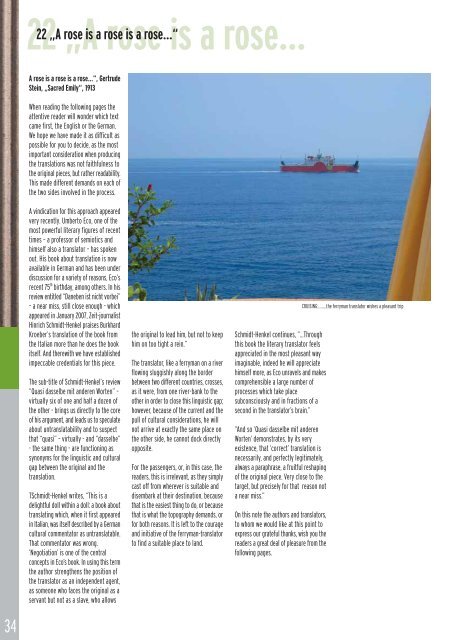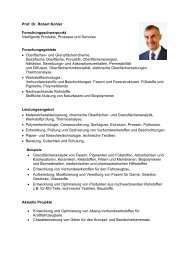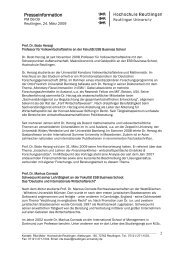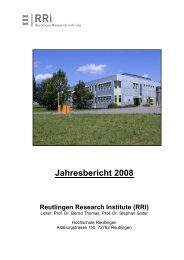Campus - Reutlingen - University - Magazine - Hochschule ...
Campus - Reutlingen - University - Magazine - Hochschule ...
Campus - Reutlingen - University - Magazine - Hochschule ...
Erfolgreiche ePaper selbst erstellen
Machen Sie aus Ihren PDF Publikationen ein blätterbares Flipbook mit unserer einzigartigen Google optimierten e-Paper Software.
34<br />
22 „A rose is a rose…<br />
22 „A rose is a rose is a rose…“<br />
A rose is a rose is a rose…“, Gertrude<br />
Stein, „Sacred Emily“, 1913<br />
When reading the following pages the<br />
attentive reader will wonder which text<br />
came first, the English or the German.<br />
We hope we have made it as difficult as<br />
possible for you to decide, as the most<br />
important consideration when producing<br />
the translations was not faithfulness to<br />
the original pieces, but rather readability.<br />
This made different demands on each of<br />
the two sides involved in the process.<br />
A vindication for this approach appeared<br />
very recently. Umberto Eco, one of the<br />
most powerful literary figures of recent<br />
times – a professor of semiotics and<br />
himself also a translator – has spoken<br />
out. His book about translation is now<br />
available in German and has been under<br />
discussion for a variety of reasons, Eco’s<br />
recent 75 th birthday, among others. In his<br />
review entitled “Daneben ist nicht vorbei”<br />
– a near miss, still close enough - which<br />
appeared in January 2007, Zeit-journalist<br />
Hinrich Schmidt-Henkel praises Burkhard<br />
Kroeber’s translation of the book from<br />
the Italian more than he does the book<br />
itself. And therewith we have established<br />
impeccable credentials for this piece.<br />
The sub-title of Schmidt-Henkel’s review<br />
“Quasi dasselbe mit anderen Worten” –<br />
virtually six of one and half a dozen of<br />
the other - brings us directly to the core<br />
of his argument, and leads us to speculate<br />
about untranslatability and to suspect<br />
that “quasi” – virtually - and “dasselbe”<br />
- the same thing - are functioning as<br />
synonyms for the linguistic and cultural<br />
gap between the original and the<br />
translation.<br />
TSchmidt-Henkel writes, “This is a<br />
delightful doll within a doll: a book about<br />
translating which, when it first appeared<br />
in Italian, was itself described by a German<br />
cultural commentator as untranslatable.<br />
That commentator was wrong.<br />
‘Negotiation’ is one of the central<br />
concepts in Eco’s book. In using this term<br />
the author strengthens the position of<br />
the translator as an independent agent,<br />
as someone who faces the original as a<br />
servant but not as a slave, who allows<br />
the original to lead him, but not to keep<br />
him on too tight a rein.”<br />
The translator, like a ferryman on a river<br />
flowing sluggishly along the border<br />
between two different countries, crosses,<br />
as it were, from one river-bank to the<br />
other in order to close this linguistic gap;<br />
however, because of the current and the<br />
pull of cultural considerations, he will<br />
not arrive at exactly the same place on<br />
the other side, he cannot dock directly<br />
opposite.<br />
For the passengers, or, in this case, the<br />
readers, this is irrelevant, as they simply<br />
cast off from wherever is suitable and<br />
disembark at their destination, because<br />
that is the easiest thing to do, or because<br />
that is what the topography demands, or<br />
for both reasons. It is left to the courage<br />
and initiative of the ferryman-translator<br />
to find a suitable place to land.<br />
Schmidt-Henkel continues, “…Through<br />
this book the literary translator feels<br />
appreciated in the most pleasant way<br />
imaginable, indeed he will appreciate<br />
himself more, as Eco unravels and makes<br />
comprehensible a large number of<br />
processes which take place<br />
subconsciously and in fractions of a<br />
second in the translator’s brain.”<br />
“And so ‘Quasi dasselbe mit anderen<br />
Worten’ demonstrates, by its very<br />
existence, that ‘correct’ translation is<br />
necessarily, and perfectly legitimately,<br />
always a paraphrase, a fruitful reshaping<br />
of the original piece. Very close to the<br />
target, but precisely for that reason not<br />
a near miss.”<br />
On this note the authors and translators,<br />
to whom we would like at this point to<br />
express our grateful thanks, wish you the<br />
readers a great deal of pleasure from the<br />
following pages.<br />
CRUISING:………the ferryman translator wishes a pleasant trip






